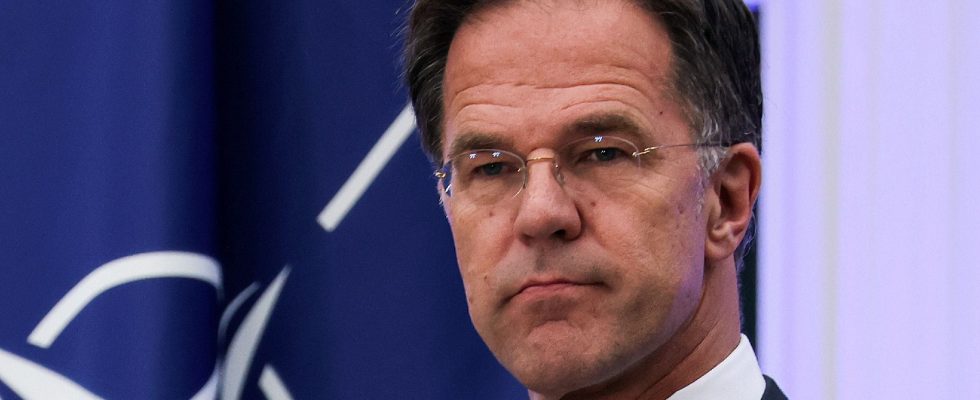Oval glasses, tight smile and impeccable hair styling, Mark Rutte looks like a discreet civil servant. But behind his austere technocratic appearance lies a leader who counts within the European Union. Hence the enthusiasm of certain countries at the idea of it regaining control over NATO. The resigning Dutch Prime Minister can count on three heavyweights in the alliance (the United States, the United Kingdom and Germany). He would replace the current Secretary General, Jens Stoltenberg, who has been at the helm of the organization for ten years.
And the terms are clear: Washington has made it “clearly known” to its allies that the Dutch head of state would make “an excellent secretary general,” said White House spokesperson John Kirby on Thursday, February 21. . Same story for the German chancellor Olaf Scholz, support from the start. “With his immense experience, his great expertise in security policy and his keen sense of diplomacy, he is an exceptional candidate,” he wrote on the social network , which could present real obstacles, the vote being unanimous.
Last July, Mark Rutte announced his departure from the Dutch political scene, due to disagreements over migration policy. While waiting for the formation of a new government, he acts as interim president. In post for thirteen years in The Hague, the 57-year-old man has imposed his style. A practicing Protestant, he is an ascetic who hates bling-bling. No question of flanking him with an army of bodyguards or giving him a company car. Leave him behind the wheel of his old Saab. As long as it runs, why scrap it? A somewhat severe pragmatism, counterbalanced by his devastating humor. The person who dreamed of being a pianist uses self-deprecation with talent and can make a room of journalists die of laughter. Also proof that he is a skilled communicator.
“Mister Teflon”
Struggling with the discontent caused by the Covid-19 confinement, Mark Rutte says he is giving up visiting his dying mother. He is applauded by public opinion. He talks about his family from time to time. We know that he is the seventh of his siblings, that his father was a ruined importer and that his brother died of AIDS in 1989. A bumpy journey which also gives him the strength to deal with scandals. Hence the nickname “Mister Teflon”, translation? Everything slides on him. Like when the country discovered that 26,000 parents had been wrongly accused of family allowance fraud. Mark Rutte resigns in January 2021 to come back better. The head of state knows how to show flexibility and give rise to unexpected turns. As in January 2020, when he apologized to the Jewish community for the persecution they suffered in the Netherlands, even though he had called for the decriminalization of Holocaust denial in 2009.
If he is popular, the Dutchman is not unanimous. Because, behind his smiles, there is a convinced liberal: cuts in the health budget, freezing of civil servants’ salaries, reductions in positions in the administration, raising the retirement age… At the European level, it he was the one who led the revolt of so-called “frugal” countries to denounce a post-Covid recovery plan that was “too generous” towards the South… An attitude which earned him the other nickname of “Mr. No”. For the former head of human resources at Unilever, the European Union is more of an economic market than a political organization. “Rutte is a tough negotiator, but he compromises and does not remain Mr. No,” noted Rem Korteweg, researcher at the Dutch think tank Clingendael, in The Express in 2021.
Moreover, seeing him advance his pawns on the international scene is surprising. In 2019, he declined the presidency of the European Council, although his favorite, before supporting the candidacy of the Belgian Prime Minister at the time, Charles Michel. At 1m93 tall, this man would be too attached to his routine, his home and… his single lifestyle. No desire to shake up your daily life in Brussels. An attitude that has undoubtedly evolved over the years.
He stands up to Trump
For daily Christian life Trouwthis appointment would be an opportunity to put the Netherlands back on the map of Europe so that they are “taken seriously again”. And on the international level? The position seems cut out for him. Due to his longevity at the head of one of the most prosperous countries in Europe, he was able to establish relationships with a number of leaders. Outside the Old Continent, he frequented former American President Donald Trump, whose possible return after the November election haunts the corridors of the Alliance in Brussels. Mark Rutte did not hesitate to go so far as to publicly contradict him during a visit to the White House.
One of the criteria mentioned at NATO is also that of sufficient commitment to Defense, in the candidates’ country of origin. Member States have committed to devoting 2% of their gross domestic product (GDP) to this, an objective to which the Netherlands is very close, thanks in particular to the action of Mark Rutte. It will be essential, NATO diplomats argue, to appear engaged on this subject in the event of Donald Trump’s return. The latter had several times called on the Allies to increase their defense spending, otherwise the United States would reduce theirs or even leave the Alliance.
Finally, on Russia, the head of state also demonstrated firmness. Since the crash of flight MH17 in 2014, he has distanced himself from Moscow, aware of the danger that his Kremlin counterpart could represent. Since the war in Ukraine, his unwavering support for kyiv has earned him several criticisms in his country. In August 2023, Mark Rutte bypassed parliament after announcing that the Netherlands would supply Ukraine with F-16 fighter jets. Proof, if necessary, that Mark Rutte is not afraid to come out on top.
